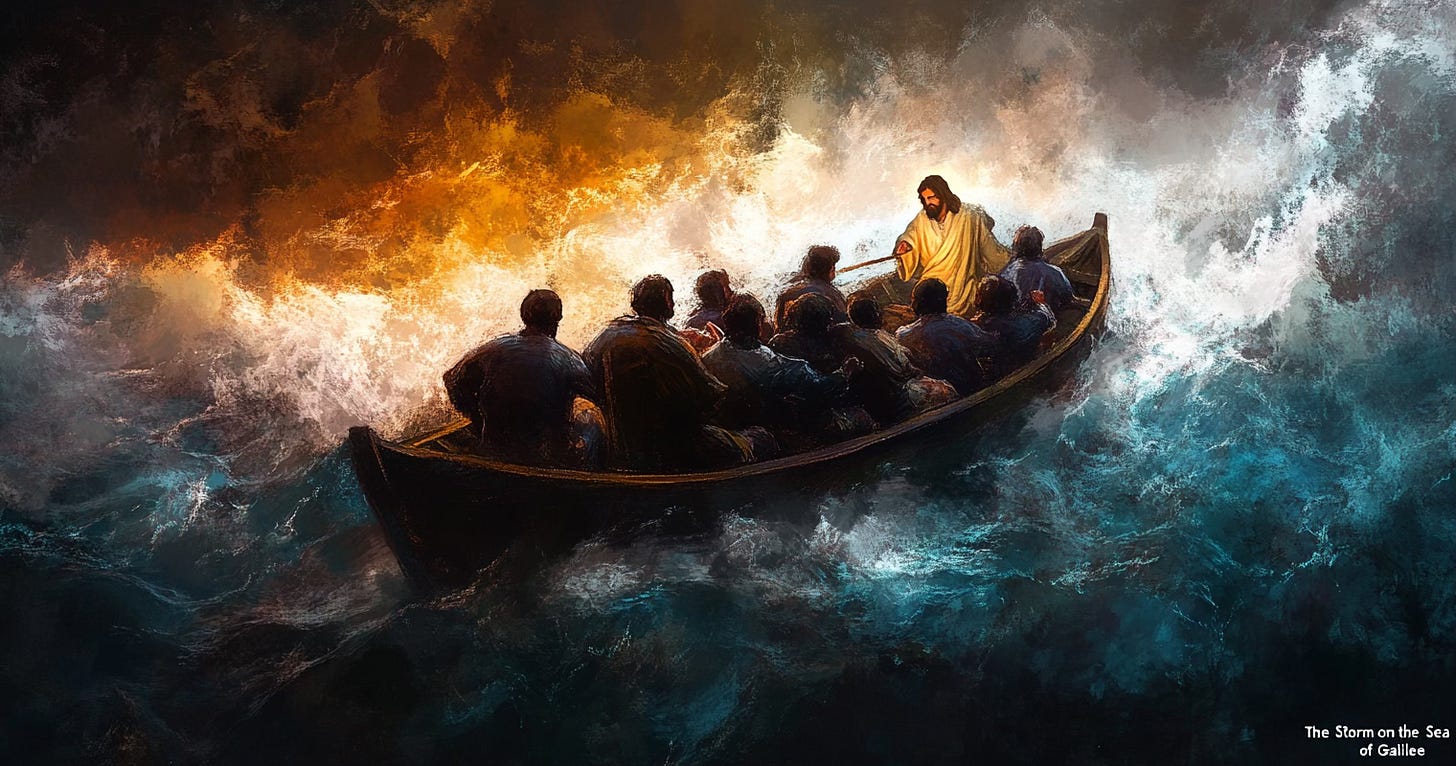Based on Mark 4:35-41 (Jesus Calms the Storm)
My dear friends in Christ,
"Peace! Be still!" These words of Jesus echo across the centuries to us today, in a time when many of us feel tossed about by storms of anxiety, division, and uncertainty. In today's gospel, we find the disciples crossing the Sea of Galilee when a sudden storm threatens to overwhelm their boat. Jesus, asleep in the stern, is awakened by his terrified disciples, who cry out, "Teacher, do you not care that we are perishing?"
How familiar that cry sounds to many of us today. "Do you not care that we are perishing?" As markets tumble, as retirement accounts shrink, as policies driven by fear rather than compassion take shape, many among us feel exactly as those disciples did – tossed about by forces beyond our control, wondering if anyone cares about our well-being.
The Storm Around Us
Let's be honest with one another. We are living through a frightening time. Many of you have shared your anxieties with me – worries about economic security as markets react to proposed tariffs, concerns about the erosion of democratic norms, fears about what the future holds for your children and grandchildren. These fears are real, and I would never dismiss them.
But notice something crucial in our gospel story: Jesus doesn't rebuke the disciples for being in the storm. Storms happen. Jesus doesn't blame them for their boat taking on water. That's what happens in storms. Instead, he questions their fear: "Why are you afraid? Have you still no faith?"
Fear vs. Faith
This isn't a condemnation but an invitation – an invitation to a different way of being in the storm. Jesus doesn't promise his followers they'll never face storms. In fact, it was Jesus himself who directed them to "go across to the other side" – to cross boundaries, to move from familiar territory into the unknown. And when storms arose during that crossing, he didn't abandon them.
The forces that create fear in our society today are real. Economic uncertainty, political division, the erosion of shared values – these are like waves battering our collective boat. But Jesus's question echoes to us today: "Why are you afraid? Have you still no faith?"
This isn't a glib dismissal of our concerns. It's a profound invitation to a different way of being in the storm – not controlled by fear, but anchored in the presence of the One who commands even the wind and the sea.
Finding Our Navigational Fix
When I served on submarines, we would periodically come to "periscope depth" to get what we called a "navigational fix" – checking our position against fixed points of reference. In times of societal storm, we too need to come to periscope depth and check our position against fixed points of reference.
What are those fixed points? Jesus provides them: "You have heard it was said... but I say to you..." Love your enemies. Pray for those who persecute you. Blessed are the peacemakers. Whatever you did for the least of these, you did for me. Turn the other cheek. These teachings aren't conditional. They don't change with political winds or economic indicators.
When we find ourselves caught in storms of fear – fear about markets, fear about politics, fear about the future – we need to get a navigational fix from these fixed points of Jesus's teaching. And let's be honest: many who claim the name Christian today have drifted far off course, using faith to justify policies and attitudes that bear little resemblance to the way of Jesus.
Being With, Not Doing To
Here I want to speak with particular love and concern to those who find their faith aligned with political movements that promote fear of the other, that prioritize power over service, that seek dominance rather than justice. I understand the anxieties that drive these alignments – worries about cultural change, economic uncertainty, loss of familiar traditions.
But Jesus never calls us to respond to our anxieties by seeking dominance over others. He never endorses using power to protect ourselves at others' expense. Instead, he shows us through his incarnation that God's way is not doing things to others or even for others, but being with others in loving solidarity.
When Jesus calms the storm, he doesn't do so from the safety of the shore. He's in the boat with the disciples, experiencing the same battering waves, the same howling winds. This is our model – not retreating to safety while others suffer, not imposing our will on others from a position of power, but being with those who suffer, standing alongside the vulnerable, even when it means facing the storm ourselves.
The Courage to Cross Boundaries
Notice that this whole episode begins with Jesus saying, "Let us go across to the other side." Jesus was constantly compelling his disciples to cross boundaries – geographical boundaries, social boundaries, religious boundaries. He sent them from familiar Jewish territory into Gentile lands, from places of cultural comfort to regions deemed unclean.
Today, Jesus continues to call us to cross boundaries – to move beyond our comfort zones, to encounter those different from ourselves, to build bridges rather than walls. This crossing requires courage, especially in times when powerful voices encourage us to retreat into tribal enclaves of sameness and safety.
Here I want to speak directly to those who have aligned their faith with movements that demonize immigrants, that view religious or ethnic differences as threats, that seek to maintain cultural dominance rather than embrace diversity. I understand the fear of change, the anxiety about losing what feels familiar and safe. But Jesus consistently calls his followers not to safety but to courage – the courage to cross boundaries, to welcome strangers, to expand rather than contract our circle of concern.
"Take Heart, It Is I; Do Not Be Afraid"
In another storm story from the gospels, Jesus walks on water toward his frightened disciples, calling out, "Take heart, it is I; do not be afraid." This is his message to us today – not that the storms aren't real, not that the waves aren't high, but that he is present with us in the midst of them.
When financial markets tumble, when political rhetoric grows hateful, when the future seems uncertain – "Take heart, it is I; do not be afraid."
When we're tempted to secure our own safety at others' expense, when we're drawn to leaders who promise protection through domination – "Take heart, it is I; do not be afraid."
The antidote to fear is not certainty or security but presence – the presence of the One who travels in our boat, who experiences our storms, who sometimes seems to be sleeping but is never absent.
Conclusion: Called to Courage
My friends, we are called to courage in these troubled times – not the false courage that puffs itself up through domination or protects itself through exclusion, but the true courage that comes from knowing we are not alone in the storm.
We are called to be people of courage who stand against dehumanizing policies and rhetoric, who refuse to sacrifice the vulnerable for our own security, who insist on seeing the image of God in every human being regardless of nationality, religion, or politics.
We are called to be people of courage who, even as markets fluctuate and politics divide, maintain our navigational fix on Jesus's teachings about love, justice, mercy, and peacemaking.
We are called to be people of courage who, when we hear the frightened cry "Do you not care that we are perishing?", respond not with indifference or self-protection but with the same loving presence that Jesus offers us.
In the days ahead, as we face whatever storms may come, may we remember that we do not face them alone. The One who commanded the wind and the waves travels in our boat. The One who crossed boundaries to bring healing and hope walks alongside us. The One who chose vulnerability over dominance continues to show us the way of courage over fear.
May we have ears to hear when he says to us, as he said to those wind-whipped waves: "Peace! Be still!"
Amen.












